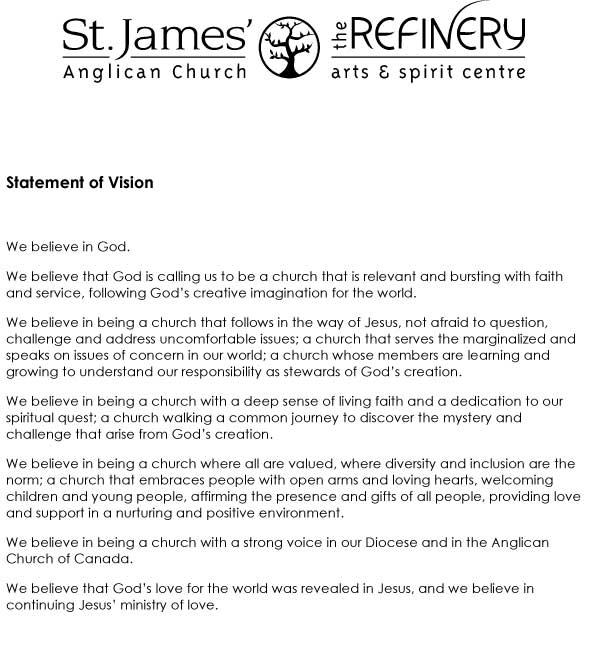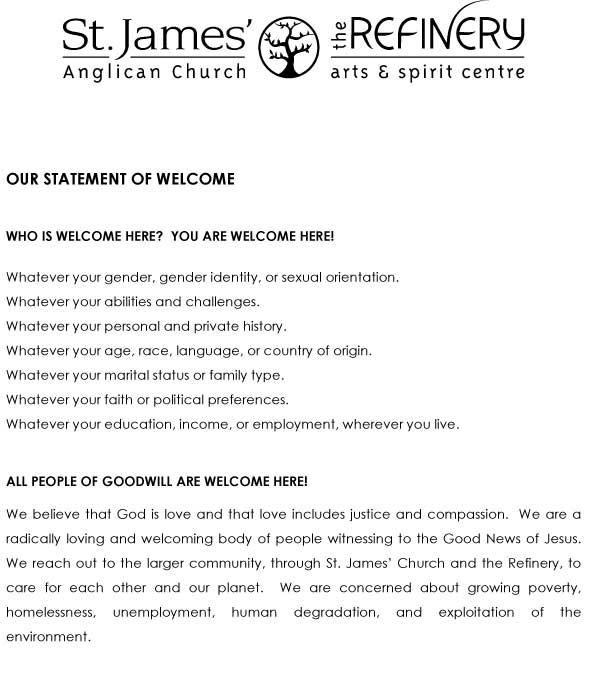Please find copies of two documents that are part of a work in process for the visioning initiatives for our parish. The first is a statement of welcome approved at our last annual meeting and the second a statement of our vision expressed in the form of a statement of faith. We recognize that a vision is never static and always a work in progress. We look forward to the results of the national project.
Messages from the Diocese of Saskatoon
Message from St. James Church, Saskatoon SK
Monday, October 5th, 2009Message from Lenn H., North Battleford SK
Monday, October 5th, 2009Vision 2019
“Where is your church – now?”
Our church seems to be in a slow decline as far as membership is concerned. I have developed a website for our church with the hope that we would become more transparent, reaching out to the people and inviting them to join with us.. http://battleriverparish.ca
I believe that it’s time to get back to the basics. By this I mean that the Gospel should come first, common sense second and tradition third. From what I observe in the church, it would appear that tradition is first, common sense second and lastly comes the Gospel.
I also believe that when sermons are give or the scriptures are read they should be delivered in a like manner as God, Jesus or the disciples would have. I think it’s wrong to make the messages more appealing so that it does not offend anyone. The Lord said “And if any man shall take away from the words of the book of this prophecy, God shall take away his part out of the book of life, and out of the holy city, and from the things which are written in this book.” Is putting a different slant on things written in the Bible any different from altering the words?
“And where do you want the Anglican Church of Canada to be by 2019?”
This question begs the question, what will the church be doing if the Lord returns within the next few years? Is the church ready for our Lords return? What part would our churches play after his return?
I can’t help but wonder why our church is not pointing out to its people, the signs of the times, and how those signs relate to the bible and the coming back of our Lord. Would this not be very interesting to the people and help them prepare for His return? The Lord said “Remember therefore how thou hast received and heard, and hold fast, and repent. If therefore thou shalt not watch, I will come on thee as a thief, and thou shalt not know what hour I will come upon thee.”
In regard to same sex unions, I fail, to be able to find any support for this in the bible. I do not believe that under any circumstance that this could be a “Blessed” union as it would appear to me to be an abomination in our Lords sight. Are we allowing Satan to influence our thinking? We are told in the bible that he will try. As for a marriage I believe this is a Blessed union sanctified by God between a man and a woman only.
I believe that if we all put our heads together, we can build a better church community. We need to find new better and exciting ways to get people involved.
In closing, I want you to know that I am very open minded and am open to comment that might help me see things differently than I have portrayed. I look forward to the results.
May God Bless our Church and oversee the results of this initiative.
Lenn H.
Message from Karen S., Saskatoon SK
Thursday, October 1st, 2009Where is our Church now?
The community in which I serve does not ‘fit’ neatly with readily accepted standards for
viability and ‘success’. St. Mark’s is a “family” church, with attendance on any given Sunday somewhere between 40+ to 80 or so. The parish consists of 3 buildings: a Church, a Hall and a Rectory – all within a half-acre lot in the north end of Saskatoon.
Worship space is small – 95 bodies in the pews would be a full house. The small white frame building looks like a ‘country church’ in the city. But make no mistake. These
old and inadequate buildings are NOT the church. The people are! And what a remarkable group of folks they are. Predominantly ‘gray’, like so many other Anglican
congregations. But there are 7 or 8 young families and a growing group of babies, toddlers and pre-schoolers. A Kids Corner has been carved out in the worship space to
enable the little ones to be themselves in our midst. Worship is characterized by informality and reverence, innovation and variety. Music is led by piano, keyboard,
& flute. St. Mark’s folks tend to be joyful, thoughtful, open and accepting of all who come through our doors. Mission includes PWRDF, local initiatives, and involves
both budgeted funds as well as special givings for particular projects. One visitor
described St. Mark’s as “the little church that could”.
The community is currently wrestling with what its future will look like. Our old buildings no longer meet needs adequately. Changes are inevitable and this both excites and frightens us. The ‘shadow’ that we live with as a community is complacency. We like who we are and how we do things. Yet we respond well to challenge and change.
Finances have thus far been solid and stable. Strong prayer ministry undergirds our
common life. The next ten years will see St. Mark’s celebrate a centenary and most likely
undergo significant changes.
My Vision of the Church in 2019
I dream of a Church that will have arrived at a place of peace within its own ‘skin’ – always testing itself against the teachings of Jesus Christ, but confident
and committed in its Mission to respond to the needs of the world in loving service.
I dream of a Church that finds its identity best lived out at the local level – in the places where people gather and where their needs & hopes intersect.
I dream of a Church that is characterized more by mutuality than by hierarchy;
where tradition is honored for its beauty and timelessness ; where innovation is
celebrated and welcomed as the winds of God move in this time and place.
I dream of a Church where all people, regardless of gender, age, race,
sexual orientation, or theological persuasion, may engage freely and fully in
the life and witness to which God calls us.
I dream of a Church that will have divested itself of many buildings, and discovered creative new ways to ‘be’ Church in both urban & rural settings.
I dream of a Church where leadership Teams may enable a fuller sharing of gifts – both lay and ordained, and more effectively serve the needs of local areas & specific communities.
I dream of a Church where joy and commitment to a shared vision will so
permeate our life, that the fear, mistrust and ‘protectionism’ that plague us now, will be dissolved in a new spirit of radical cooperation, respect and mission.
I dream that God will raise up prophetic voices amongst us, to call us forward
to the hard and holy work of living, serving and witnessing TOGETHER as
the Body of Christ in Canada during these early years of the 21st century.
I dream…………….
Message from Ann Marie N., Biggar SK
Sunday, September 20th, 2009God became incarnate and dwelt and worked among us as one of us. The Church, which is the body of Christ, needs to follow that example of Christ, not setting itself apart and pulling more into itself but working out and among our communities and the world. The Incarnation was not just about the future – eternal life – but also about the reign of God in the present. As followers of Christ we are called to work now to bring God’s kin-dom on earth. This is not just for those who call themselves Christian but for the whole of creation, including people who do not share our beliefs and for the non-human world.
I would like to see us not have our worship and studies as goals but rather as gifts that help strengthen and equip us for the work to which God calls us. This would mean that worship needs to be relative to the context of the community. This does not mean abandoning our worship traditions but building on the underlying meanings and reasons those traditions were developed.
As well, why not find ways of offering the diverse skills to be found in our worshipping communities to help the larger community? We worry so much about our aging congregations, seeing that as a drawback rather than a gift. What about retired teachers offering tutoring services in our buildings after school or in the evenings? What about other gifts that can be offered and shared among the communities we serve? It is not that the church does not do these things now. It is that we tend to see them more as special projects rather than as a way of being.
I would like to see us outside our buildings more. I would like to see more interaction with our communities around use of the buildings. Instead of having our meetings and studies in our buildings, why not gather in local gathering places where people can see us and get to know us? Why not offer our buildings as a resource to our communities not as a way of bringing in income but as a way of offering service?
I think the church needs to come to the realization that we need to meet the people where they are rather than expecting them to come to us. This would mean getting out into the places in the community where the people gather. As it says in our diocesan profile that place may be the amenity room in a condominium or coffee row in a rural community. We need to be truly welcoming of all, embracing the diversity around us as gift rather than seeking conformity.
I believe that we need to stop worrying about our own survival and live in faith that God will provide. Instead of focusing on bringing in more people to serve the maintenance of our buildings and formal structures, we could focus on spreading the good news of the Gospel to those around us by word and by action. This would mean engaging one on one with individuals or with groups, not just educating ourselves about issues or raising money. It could involve not only doing our own outreach and mission but also supporting other people’s or groups outreach and mission with our active presence.
It is when the Church has truly been the body of Christ, incarnate among the people, that it has accomplished the most toward the bringing in of the kin-dom. If we set ourselves apart, if we stay within our buildings, if we insist on people coming to us and conforming, how can we effectively work to address and reach out to the great need for life in our larger communities in the reality of today’s society?
Love and prayers,
Ann Marie N
Biggar, SK
Message from Michael M., Saskatoon SK
Friday, September 11th, 2009I believe that we have a number of issues that need to be considered and addressed in the Anglican Church. I also think that we need to ask what our relationship to the African Churches is and should be, and what our relationship with the Church of Rome is and should be.
The issues we need to consider are:
- Ordination of women
- Ordination of gay men
- Consecration of gay relationships
- Episcopal power
- How can the Anglican Church be relevant to people today
- What is our relationship with the African churches and the Church of Rome
In response to the issues:
I think there needs to be a moratorium on the ordination of women. As well, there needs to be process in place where parishes and even churches can seek alternative episcopal oversight when there are women priest or bishops that have already been ordained or elected. This ties into my response to another issue I raised (see below). Holy orders (Deacons, Priests, and Bishops) should be restricted to men only.
A gay life style is not to be encouraged or condoned. That does not mean that we should reject these people. We should love them but we should also be clear that their life choice is against Biblical teaching. A A man who is gain may be considered for the priesthood but only under the condition that he refrain from any homosexual relationship and he acknowledge that sexual relations and marriage are meant (Biblically) to be between a man and a woman.
Gay relationships should not be consecrated. The relationship is contrary to Biblical teaching and to the desire and teaching of most Christians (e.g., Roman Catholics) and most Anglicans. Marriage is between a man and a woman. Two men can be loved and supported by the church but their marriage can not.
In terms of episcopal power, there must be a strengthening of Episcopal power. In conjunction with this there must be a greater emphasis in ensuring that Bishops are orthodox, conservative, dedicated to fundamental Christian teachings, and are listening to our brothers in the African Anglican Church and to those in the Roman Catholic Church. When this occurs Bishops must be given more power to control and discipline clergy who do not follow orthodox teaching.
The Anglican Church can be relevant today by returning to the true message of the Gospel. By retuning to traditional orthodox teachings, by returing to the BCP, moving for greater relations with the Roman Catholic Church, the Orthodox Church, and our African Brothers. Some examples of very simple things that should be done include:
- priests wearing collars all the time
- returning to the use of cassocks
- visibly presence on university campuses (e.g., wearing collars and cassocks)
- outreach where we are visibly recognizable
- mission work within Canada and overseas
- greater emphasis on the liturgy and its meaning (e.g., having High Mass more often)
Lastly, the Anglican Church of Canada should be focusing its efforts on strengthening its ties with the orthodox traditional conservative African churches (our brothers in Christ) and working to bring a greater level of communion between us and the Roman Catholic and Orthodox Churches (as opposed to the Lutheran or United Churches)
We must remember that we are to stay true to the Gospel and preach the truth not cater to a Godless and materialistic society.
Thank you.
Message from Rt. Rev. Tom Morgan, Saskatoon SK
Friday, July 10th, 2009
The Rt. Rev. Tom Morgan, retired Archbishop of Saskatoon and member of the Board of Directors of the Primate’s World Relief and Development Fund responds to the question: Where is your church now, and where do you want the Anglican Church of Canada to be in 2019?
Message from The Rt. Rev. Rodney Andrews, Diocese of Saskatoon
Wednesday, May 6th, 2009
Filmed at the recent House of Bishops meeting in Niagara Falls, Ont.





